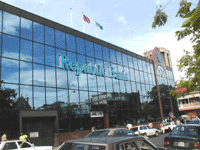 Over the last 163 years, Republic Bank Limited (RBL) have gained a reputation as the premier bank in Trinidad and Tobago. The Bank’s assets stand at well over TT$15.8 Billion and it now employs over 2,500 people. With a well-established branch network, Republic Bank has expanded its operations beyond it’s home base, and positioned itself as the financial service institution of choice in the Caribbean.
Over the last 163 years, Republic Bank Limited (RBL) have gained a reputation as the premier bank in Trinidad and Tobago. The Bank’s assets stand at well over TT$15.8 Billion and it now employs over 2,500 people. With a well-established branch network, Republic Bank has expanded its operations beyond it’s home base, and positioned itself as the financial service institution of choice in the Caribbean.
Today, Republic Bank comprises an extensive network of six specialised divisions, which attend to the needs of corporate, commercial and individual clients. The Bank’s services are as diverse as international and local credit cards, trade and invoice financing, foreign exchange, trust and asset management, investments and securities trading services. These are supported by one of the most sophisticated, up-to-date technological infrastructures in the Caribbean. Republic also has the most extensive range of electronic banking services in the region, offering state-of-the-art facilities to the individual, corporate and commercial clients.
 In 1995, the Bank reviewed its archival and retrieval processes, conscious of the fact that records needed to be maintained for both regulatory and customer service purposes. At that time, microfilm and paper were used to store all of the Bank’s documentation. Reports, copies of customer statements, internal branch reference documents and General Ledger reports, were printed daily on around 10 boxes of standard continuous paper, and then delivered and stored at the respective branches. Retrieval of specific information was an extremely labourious process, sometimes taking days at the very least.
In 1995, the Bank reviewed its archival and retrieval processes, conscious of the fact that records needed to be maintained for both regulatory and customer service purposes. At that time, microfilm and paper were used to store all of the Bank’s documentation. Reports, copies of customer statements, internal branch reference documents and General Ledger reports, were printed daily on around 10 boxes of standard continuous paper, and then delivered and stored at the respective branches. Retrieval of specific information was an extremely labourious process, sometimes taking days at the very least.
After a lengthy evaluation process, Republic Bank decided to acquire a corporate licence for Hitec’s DataStore System. One of the reasons for that selection was the availability of our trained support from Savannah Computing.
Initially, DataStore was implemented throughout the Branch network as standalone systems. A routine was developed to distribute reports to Branches via diskettes from the Data Centre. From the diskette, the information would be uploaded onto the branch server for queries. These reports were kept on-line for a five-day cycle, where the earliest report would be uploaded and indexed. A dramatic reduction in paper consumption was achieved from inception.
Subsequently, with the implementation of the Local Area networks at Branches and with the implementation of the Wide Area Network, the system was extended to include network versions of DataStore. The Bank then utilised the WAN to transfer the reports from the Data Centre to each to each Branch, where the upload and indexing process continues today. In the meantime, the acquisition of another Bank increased the total number of branches to 48. Again, the system was extended to include archiving of additional reports from other systems; e.g. the transaction log reports from the Electronic Banking system.
The DataStore solution has provided RBL with a large number of benefits that have had a major impact on their operating procedures. “The DataStore users are extremely satisfied and have adjusted very well to the paperless (actually, less paper) organisation. Their time is being maximised and we have gained a real cost justification from DataStore,” says Savita Vishnu, Republic Bank’s Manager, Application Services.
RBL is also able to rely on DataStore as a support mechanism for checking customers’ account balances, should the Bank’s online system become unavailable. Republic Bank’s Specialist Offices (i.e. Credit Card Centre, Trust and Asset Management (TRAM), FINCOR, Centralised Securities and the Foreign Exchange Centre (FOREX)) have also installed DataStore systems to archive computer generated output specific to their operations from entirely different applications. Says Savita Vishnu; “The integration of DataStore with existing technology is most definitely a worthwhile expenditure that has given us a rapid return on investment, and one that will be included in other departments within Republic Bank and our subsidiaries.”
